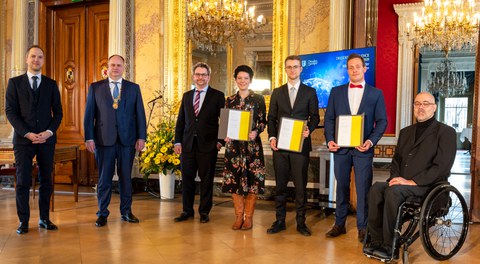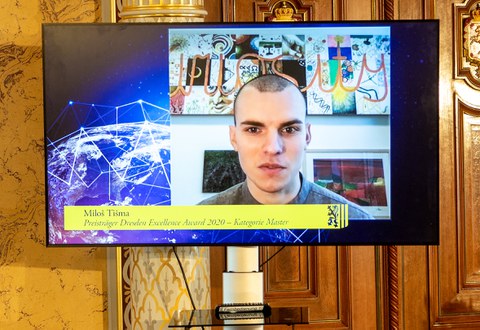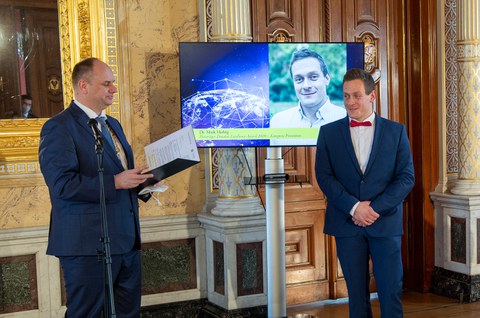Mar 24, 2021
Two CMCB graduates receive DRESDEN EXCELLENCE AWARD
On Saturday March 20th, the City of Dresden has presented the DRESDEN EXCELLENCE AWARD. The annual prize is awarded for exceptional scientific work originating in Dresden. Miloš Tišma received the prize for an outstanding Master’s thesis and Dr. Maik Herbig for an excellent PhD thesis.
Every year the City of Dresden, together with the network “Dresden – City of Science”, recognizes the outstanding scientific work performed in Dresden with the DRESDEN EXCELLENCE AWARD. A total of 30.000 euro is awarded to four scientists across the academic levels of Bachelor, Master, PhD, and habilitation.
Excellent Master’s Thesis – Miloš Tišma
Miloš Tišma studied Molecular Bioengineering at the CMCB. He completed his Master’s thesis under supervision of Prof. Michael Schlierf in the Center for Molecular Bioengineering – B CUBE.
In his Master’s thesis, Miloš approached the growing challenge of antibiotic-resistant bacteria. He studied the molecular pathway that allows bacteria to adapt to the antibiotics. Miloš used a combination of genetic engineering, microbiology, state-of-the-art microscopy, and biophysical modeling to focus on LexA, the key regulator of the SOS response, crucial in the development of antibiotic resistance. He was able to create the first model of the dynamic states of LexA and their response to antibiotics.
“Miloš has developed a method that allowed to directly observe LexA in living bacteria. He and his colleagues could follow how the bacterial cells react to antibiotics under the microscope in real time,” says Prof. Michael Schlierf, research group leader and managing director of B CUBE. “His excellent work has set foundation for a number of projects that are currently ongoing in our research group.”
After graduating, Miloš has moved to Netherlands and is currently working on his PhD project at TU Delft.
To read more about Miloš Tišma’s Master’s project, visit the website of the City of Dresden.
Excellent PhD Thesis – Dr. Maik Herbig
Dr. Maik Herbig had quite an extraordinary path to a PhD. He started working as a technician in the Guck research group at the Biotechnology Center of TU Dresden (BIOTEC) in 2014. At some point, a vast amount of collected data has sparked an idea for a research project that ultimately contributed to his PhD.
The PhD work of Dr. Herbig was focused on identification of different cell types. Identifying and sorting out particular cell types is one of the challenges of biomedical research and modern medicine. Theoretically, such an approach allows to purify certain cell types from a mixed biological sample. For example, collecting photoreceptor cells for retinal transplantation. Currently, there are cell sorting techniques that make identification and sorting of different cell types possible. However, most of the techniques rely on addition of fluorescent labels which contaminate the sample and make it unfavorable to use them for clinical applications.
The Guck research group has developed a Real Time Deformability Cytometry (RT-DC) technique. RT-DC is able to sort cells based on the specific molecular markers but it also measures mechanical properties and collects morphological data, i.e., the bright-field image of the cells.
In his thesis, Dr. Herbig developed an algorithm that allowed to identify and sort cells based purely on the images, without the need to use any fluorescent labels. Neural networks were trained to differentiate between different cell types. Such trained neural networks were then used to identify the cells in the sample in real time to make sorting decisions.
In order to popularize this technique, Dr. Herbig wrote AIDeveloper, an open-source software that enables people without programming knowledge to train neural networks. He also developed a statistical method that allows robust statistical tests for data collected on RT-DC. The spin-off company Zellmechanik Dresden has adopted this method in the open-source analysis software ShapeOut.
Dr. Herbig’s doctoral project was a collaborative work involving the Guck research group at BIOTEC and the Ader research group at the Center for Regenerative Therapies Dresden (CRTD). After completing his PhD, Dr. Maik Herbig joined the Ader group and continues his extraordinary scientific path. He was recently offered an Assistant Professor position at the University of Tokyo, where he will start his own research group.
To read more about Dr. Maik Herbig’s PhD project, visit the website of the City of Dresden.
DRESDEN EXCELLENCE AWARD 2021 is open for applications
The application for the next edition of the DRESDEN EXCELLENCE AWARD 2021 is already open. The application deadline falls on the World Science Day, November 10, 2021. For further information and application details visit www.dresden.de/excellenceaward



